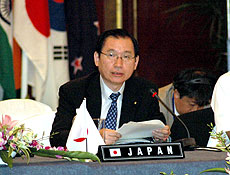(Check against delivery)
Statement by Mr. Masayoshi Hamada,
Vice Minister for Foreign Affairs of Japan
At the First East Asia Summit (EAS) Energy Ministers' Meeting

23 August, 2007
Shangri - La Hotel, Singapore
Honorable chairman, I would like to take this opportunity to express my great appreciation to Singapore's initiative in hosting the First EAS Energy Ministers' Meeting today. I would like to make brief comment on the ECTF efforts.
Concerning energy market integration in East Asia region, we have just started discussing transit and investment issues, and I think there exists a great potential for future cooperation in these fields.
Transit issues including security of energy transportation routes are of great significance in enhancing regional energy security. In particular, securing safety navigation through the Straits of Malacca and Singapore, a main artery for energy transportation, is of vital interest also for Japan. On 20 August, Prime Minister Abe expressed his strong determination to make further cooperation in this area during his visit to Indonesia. In addition, it is also important for the EAS member countries to identify the potential risks such as terrorist attacks, piracy and natural disaster, as well as to study safety measures and emergency response to such threats. I am convinced that we, East Asian countries, should play a greater role in this field in the years to come.
In promoting East Asian energy market integration in phases, the Energy Charter Treaty would be a good example to be referred to. Russia, most of European countries, Japan and Australia have already joined the Energy Charter framework, and it has greatly contributed to comprehensive facilitation of free and open trade, transit and investment in tandem. In this regard, it is very encouraging that the Philippines began its process of joining the Treaty.
Mr. Chairman,
After 2nd EAS held in Cebu in January this year, Prime Minister Abe announced four energy cooperation initiatives, one of which stated that Japan provides energy related ODA approximately to 2 billion US dollars over three years to eradicate energy poverty. It is a great pleasure to be able to share with you that Japan has already decided to provide approximately 960 million US dollar-worth grant and yen-loan assistance for construction of power plants and grids in India, Vietnam, Indonesia, Cambodia and the Philippines.
Let me also elaborate on Japan's new proposal on climate change, namely the "Cool Earth 50" which Minister Amari has just mentioned. Japan will extend wide-range support for the efforts against global warming to those developing countries with high aspirations, I mean, countries which support the proposal and work hard to reduce greenhouse gas emissions and to achieve economic growth in a compatible way. The EAS members should cooperate in the steady follow-up of the Cebu Declaration, which will lead to the enhancement of energy security and the resolution of climate change issues.
I understand that environment, climate change and sustainable development as well as energy security will be among major themes of the Third East Asia Summit to be held here in Singapore in November. I strongly hope that today's meeting will be able to contribute greatly to the EAS process with its tangible results, which should be reported to the Summit. This sort of practice will, I believe, eventually lead to stronger foundation of the EAS as a regional cooperation framework, and this in turn provides clearer vision for further prosperity and stability of the region.
Back to Index
